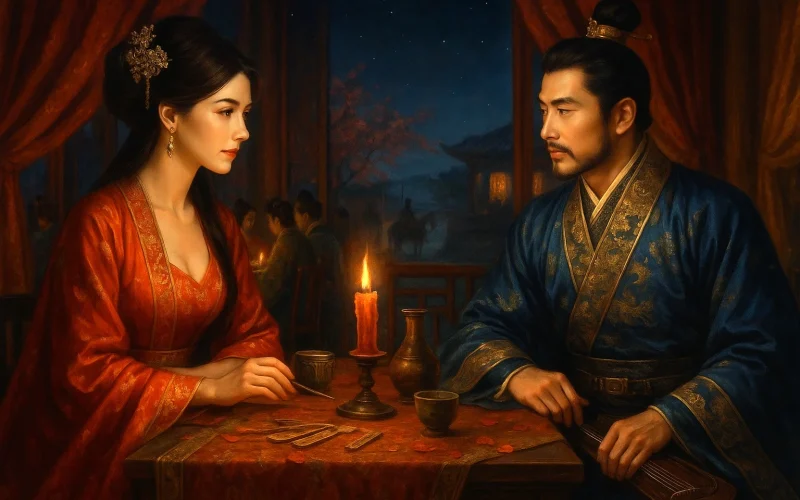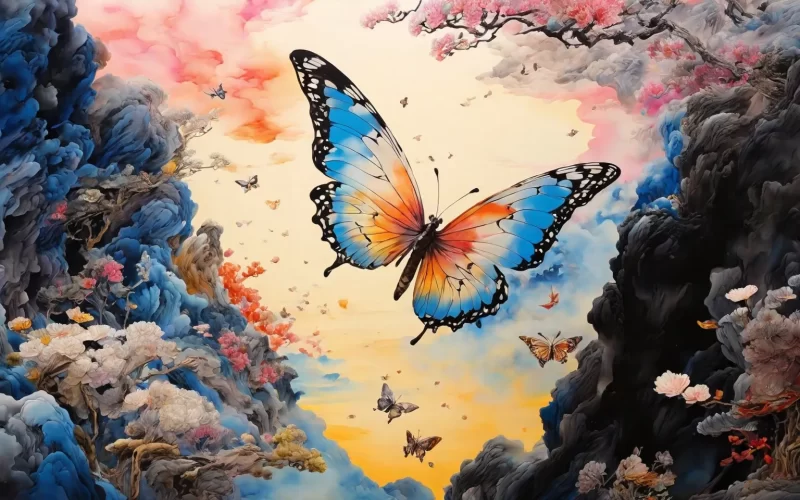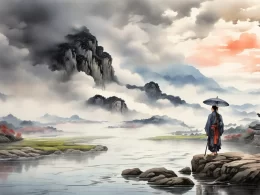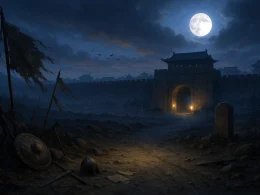The stars of last night and the wind of last night
Are west of the Painted Chamber and east of Cinnamon Hall.
...Though I have for my body no wings like those of the bright-coloured phoenix,
Yet I feel the harmonious heart-beat of the Sacred Unicorn.
Across the spring-wine, while it warms me, I prompt you how to bet
Where, group by group, we are throwing dice in the light of a crimson lamp;
Till the rolling of a drum, alas, calls me to my duties
And I mount my horse and ride away, like a water-plant cut adrift.
Original Poem
「无题二首 · 其一」
李商隐
昨夜星辰昨夜风,画楼西畔桂堂东。
身无彩凤双飞翼,心有灵犀一点通。
隔座送钩春酒暖,分曹射覆蜡灯红。
嗟余听鼓应官去,走马兰台类转蓬。
Interpretation
Composed during the Tang Dynasty, this untitled work by Li Shangyin exemplifies his signature style of exploring romantic entanglement. While many of his "untitled" poems treat romantic themes, this particular piece articulates the paradox of spiritual intimacy amidst physical separation. The poem oscillates between recollections of last night's communion and today's solitary longing, achieving profound emotional resonance through exquisite temporal shifts.
First Couplet: "昨夜星辰昨夜风,画楼西畔桂堂东。"
Zuó yè xīng chén zuó yè fēng, huà lóu xī pàn guì táng dōng.
Last night's stars, last night's breeze / West of painted tower, east of cassia hall
The anaphoric "last night" creates rhythmic nostalgia, while the architectural details ("painted tower", "cassia hall") construct an elite social setting. The parallelism of celestial and earthly coordinates suggests lovers perfectly aligned in time and space - now tragically disrupted.
Second Couplet: "身无彩凤双飞翼,心有灵犀一点通。"
Shēn wú cǎi fèng shuāng fēi yì, xīn yǒu líng xī yī diǎn tōng.
Lacking phoenix wings to pair in flight / Yet hearts share the unicorn's telepathic light
This iconic couplet juxtaposes physical limitation ("phoenix wings" symbolizing marital unity) with spiritual transcendence ("unicorn's horn" representing mystical connection). The biological impossibility of two phoenixes flying together underscores societal barriers, while the mythical rhinoceros horn (believed to detect poison) becomes metaphor for lovers' intuitive bond.
Third Couplet: "隔座送钩春酒暖,分曹射覆蜡灯红。"
Gé zuò sòng gōu chūn jiǔ nuǎn, fēn cáo shè fù là dēng hóng.
Hooked fingers passed across warm spring wine / Team games played 'neath crimson candle shine
The banquet scene unfolds through tactile and visual details - the drinking game's intimate "hooked fingers" contrasting with formal "team games". The "crimson candles" (traditional wedding symbolism) ironically illuminate not nuptials but stolen moments, their wax melting like time itself.
Fourth Couplet: "嗟余听鼓应官去,走马兰台类转蓬。"
Jiē yú tīng gǔ yìng guān qù, zǒu mǎ lán tái lèi zhuǎn péng.
Alas! Dawn drums summon me away / Galloping to Orchid Tower like wind-blown astray
The bureaucratic "dawn drums" rupture romance, reducing the poet to a tumbleweed ("wind-blown") in the imperial machine. "Orchid Tower" (secretariat reference) becomes prison rather than prestige, its floral name mocking his emotional aridity. The equestrian imagery underscores forced mobility versus desired stability.
Holistic Appreciation
The poem masterfully choreographs temporal layers: the eternal present of memory ("last night" repeated), the abrupt morning separation, and the timeless ache thereafter. Each couplet forms a diptych - celestial/earthly, body/soul, warmth/cold, freedom/confinement - embodying love's essential paradoxes. The banquet's lively games become poignant counterpoint to the bureaucratic solitude that follows, transforming social rituals into metaphors for life's cruel transitions.
Artistic Merits
- Dualistic Structure: Binary oppositions (night/day, union/separation, private/public) create dialectical tension throughout.
- Ceremonial Subversion: Wedding symbols (phoenix, candles) are repurposed to highlight unconsummated love.
- Kinetic Imagery: From "hooked fingers" to "galloping horse", physical motions trace emotional trajectories.
Insights
This Tang masterpiece speaks across millennia to our digital age of "connected loneliness". The lovers' predicament mirrors modern relationships where emotional intimacy often flourishes despite geographical or societal barriers. The poem ultimately celebrates love's triumph over circumstance - not through physical union, but through the more enduring victory of mutual understanding. It suggests that the deepest connections exist beyond spatial constraints, in what the poet calls "the unicorn's telepathic light".
Poem translator
Kiang Kanghu
About the poet

Li Shangyin (李商隐), 813 - 858 AD, was a great poet of the late Tang Dynasty. His poems were on a par with those of Du Mu, and he was known as "Little Li Du". Li Shangyin was a native of Qinyang, Jiaozuo City, Henan Province. When he was a teenager, he lost his father at the age of nine, and was called "Zheshui East and West, half a century of wandering".










